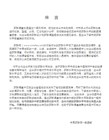大学英语精读2U3(课堂PPT)
- 格式:ppt
- 大小:4.04 MB
- 文档页数:77



现代英语精读二第三版课件文档现代英语精读二第三版课件文档是一份重要的教学资源,旨在帮助学生更好地理解和掌握英语语言知识,提高英语阅读和表达能力。
本课件文档包含课文讲解、词汇表、语法分析、练习题等内容,旨在帮助学生全面提高英语水平。
一、课件内容概述现代英语精读二第三版课件文档共包括十个单元,每个单元包含两篇课文,每篇课文分为三个部分:背景知识、课文讲解和词汇表。
在课文讲解部分,我们将详细分析文章中的重点词汇、短语和句型,帮助学生更好地理解文章内容。
同时,我们还针对每个单元的重点语法进行讲解和分析,帮助学生掌握语法知识。
此外,本课件还包含大量的练习题,包括选择题、填空题、翻译题等,旨在帮助学生巩固所学知识,提高英语阅读和表达能力。
二、课件使用方法本课件文档适合学生自主学习使用,也适用于课堂教学。
在使用本课件时,建议按照以下步骤进行:1. 预习:学生在课前预习课文,了解文章背景知识,并尝试理解文章大意。
2. 学习:在课堂上或课后,学生认真听取教师的讲解,结合课件中的词汇表和语法分析,深入理解文章内容。
3. 练习:学生完成课件中的练习题,巩固所学知识。
4. 复习:在学完一个单元后,学生回顾课件中的重点词汇和语法知识,加深印象。
三、课件亮点分析1. 内容丰富:本课件包含丰富的课文讲解、词汇表、语法分析、练习题等内容,能够全面满足学生的学习需求。
2. 重点突出:在课文讲解部分,我们将重点词汇、短语和句型进行详细分析,帮助学生更好地理解文章内容。
同时,我们还针对每个单元的重点语法进行讲解和分析,让学生掌握语法知识。
3. 针对性强:本课件中的练习题具有很强的针对性,能够帮助学生巩固所学知识,提高英语阅读和表达能力。
4. 易于操作:本课件采用多媒体形式,界面简洁易懂,操作简单方便,适合各种水平的学生使用。
四、总结现代英语精读二第三版课件文档是一份高质量的教学资源,旨在帮助学生更好地理解和掌握英语语言知识,提高英语阅读和表达能力。



Jefferson died long ago, but may of his ideas still of great interest to us.Lessons from JeffersonThomas Jefferson, the third President of the United States, may be less famous than George Washington and Abraham Lincoln, but most people remember at last one fact about him: he wrote the Declaration of Independence.Although Jefferson lived more than 200 years ago, there is much that we learn from him today. Many of his ideas are especially interesting to modern youth. Here are some of the things he said and wrote:Go and see. Jefferson believed that a free man obtains knowledge from many sources besides books and that personal investigation is important. When still a young man, he was appointed to a committee to find out whether the South Branch of the James River was deep enough to be used by large boats. While the other members of the committee sat in the state capitol and studied papers on the subject, Jefferson got into a canoe and made on-the-spot-observations.You can learn from everyone. By birth and by education Jefferson belonged to the highest social class. Yet, in a day when few noble persons ever spoke to those of humble origins except to give an order, Jefferson went out of his way to talk with gardeners, servants, and waiters. Jefferson once said to the French nobleman, Lafayette, "You must go into the people's homes as I have done, look into their cooking pots and eat their bread. If you will only do this, you may find out why people are dissatisfied and understand the revolution that is threatening France."Judge for yourself. Jefferson refused to accept other people's opinions without careful thought. "Neither believe nor reject anything," he wrote to his nephew, "because any other person has rejected or believed it. Heaved has given you a mind for judging truth and error. Use it."Jefferson felt that the people "may safely be trusted to hear everything true and false, and to form a correct judgment. Were it left to me to decide whether we should have a government without newspapers or newspapers without a government, I should not hesitate a moment to prefer the latter."Do what you believe is right. In a free country there will always be conflicting ideas, and this is a source of strength. It is conflict and not unquestioning agreement that keeps freedom alive. Though Jefferson was for many years the object of strong criticism, he never answered his critics. He expressed his philosophy in letters to a friend, "There are two sides to every question. If you take one side with decision and on it with effect, those who take the other side will of course resent your actions."Trust the future; trust the young. Jefferson felt that the present should never be chained to customs which have lost their usefulness. "No society," he said, "can make a perpetual constitution, or even a perpetual law. The earth belongs to the living generation." He did not fear new ideas, nor did he fear the future. "How much pain," he remarked, "has been caused by evils which have never happened! I expect the best, not the worst. I steer my ship with hope, leaving fear behind."Jefferson's courage and idealism were based on knowledge. He probably knew more than any other man of his age. He was an expert in agriculture, archeology, and medicine. He practiced crop rotation and soil conservation a century before these became standard practice, and he invented a plow superior to any other in existence. He influenced architecture throughout America, and he was constantly producing devices for making the tasks of ordinary life easier to perform.Of all Jefferson's many talents, one is central. He was above all a good and tireless writer. His complete works, now being published for the first time, will fill more than fifty volumes. His talent as an author was soon discovered, and when the time came to write the Declaration of Independence at Philadelphia in 1776, the task of writing it was his. Millions have thrilled to his words: "We hold these truths to be self-evident, that all men are created equal…"When Jefferson died on July 4, 1826, the 50th anniversary of American independence, he left his countrymen a rich legacy of ideas and examples. American education owes a great debt to Thomas Jefferson, Who believed that only a nation of educated people could remain free.NEW WORDSdeclarationn. document containing an open public announcement 宣⾔independencen. freedom from the control of others 独⽴obtainvt. get through effort 获得sourcen. place from which sth. comes; place where a river starts (来)源;源头personala. done in person; belonging to a person 亲⾃的;个⼈的investigationn. detailed or careful examination 调查investigatevt.appointvt. put (sb.) in a position 任命appointmentn.committeen. a group of people chosen for special duties 委员会capitoln. (美国)州议会⼤厦canoen. light boat moved by a paddle 独⽊⾈on-the-spota. at the place of the action 现场的humblea. low in position 地位低下的originn. parentage; birth; beginning ⾎统;出⾝;起源gardenern. person who works in a garden either for pay or as a hobby 园丁waitern. person who serves food to the tables in a restaurant (男)侍者noblemann. 贵族dissatisfyvt. hang over dangerously; utter a threat against 使不满threatenvt. hang over dangerously; utter a threat against 威胁threatn.rejectvt. refuse to take, believe, use of consider 拒绝rejectionn.nephewn. the son of one's brother or sistererrorn. mistake; sth. done wronglyfalsea. not true or correctjudgmentn. opinion 判断,看法hesitatevi. feel doubtful; be undecided 犹豫,迟疑不决hesitationn.prefervt. like better; choose (one thing) rather than (another) 更喜欢;宁愿preferencen.lattera. nearer to the end 后⾯的;后半的n. the second of two persons or things just spoken of 后者conflictn. be opposed; clash 冲突n. disagreement; clash; fightunquestioninga. given or done without question or doubtagreementn. having the same opinion(s); thinking in the same way 同意;⼀致的criticismn. unfavourable remarks of judgments 批评criticn. person who makes judgments about the good and bad qualities of sth.; person who points out mistakes 评论家;批评者criticizevt.philosophyn. 哲学resentvt. feel angry or bitter at 对...忿恨;对...不满actionn. the process of doing things; sth. done ⾏动过程;⾏动customn. 习惯,风俗perpetuala. never-ending; going on for a long time or without stopping 永恒的;连续不断的constitutionn. 宪法;章程livinga. alive now 活(着)的remarkvt. say; comment 说;评论说n. 话语;评论eviln. sth. bad; sin 邪恶,罪恶a. very bad 邪恶的,坏的idealismn. 理想主义;唯⼼主义arch(a)eologyn. study of ancient things, esp. remains of prehistoric times 考古学rotationn. 轮作;旋转rotatev.conservationn. protecting from loss of from being used up 保护;保存conservevt.superiora. good or better in quality or value 较好的;优的superiorityn.existencen. the state of existing 存在influencevt. have an effect on 影响architecturen. art and science of building 建筑术;建筑学constantlyad. continuously; frequently 不断地;经常地constanta.performvt. do, carry out 做,履⾏talentn. special natural ability 才能,天资centrala. chief; main; most important 主要的tirelessa. never or rarely getting tiredwritern. a person who writes esp. as a way of earning money 作家publishvt. have (a book, etc.) printed and put on sale 出版volumen. book, esp. one of a set of books 卷;册thrillvi. have a very exciting feeling ⾮常激动self-evidenta. clear without proof 不⾔⽽喻的createvt. make (sth. that has not been made before) 创造creationn.anniversaryn. the yearly return of a special date 周年纪念⽇countrymann. a person from one's own country 周胞legacyn. sth. that one person leaves to another when he dies 遗产owevt. ⽋(债等);应把...归功于debtn. something owed to someone else 债(务)educatevt. train; teach how to read, write, think, etc.。